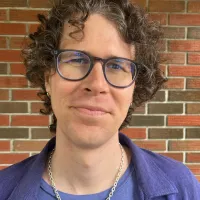Andi Binet
MCP & PhD, MIT Dept of Urban Studies & Planning
Assistant Professor, Community-Engaged Research
- Office: WMAX 229
- Email: andi.binet@ubc.ca
Andi Binet is an Assistant Professor of Community-Engaged Research in the School of Community and Regional Planning at UBC. Through community-based, participatory research processes, they collaborate with community members to ask, answer and act on research questions that matter to them. Andi is especially interested in understanding how urban environments shape our health and the relationships of care that sustain us, and how social and community planning can be tools for responding to the contemporary crisis of care and achieving health equity. They are currently leading an SSHRC Insight Grant (2025-2029) exploring the role of urban planning in building a universal child care system in B.C.
Since 2015, Andi has been a proud co-lead of the Healthy Neighborhoods Study, a longitudinal Participatory Action Research project exploring the relationship between gentrification and community health in nine Boston-area neighborhoods.
Learn more about the Healthy Neighborhoods Study
Andi earned their PhD from the Department of Urban Studies and Planning at MIT. Their dissertation, “Making the City Livable: Caregiving and Health in Gentrifying Boston,” won the 2022 ACSP Barclay Gibbs Jones Award for Best Dissertation in Planning. Following their PhD, Andi was a Postdoctoral Fellow at DUSP from 2021-2023, working on the Healthy Neighborhoods Study and co-teaching Participatory Action Research.
Dr. Binet’s research explores the intersections of urban planning and health equity, with a feminist focus on care and social reproduction in cities. They are currently leading a multi-year study of childcare planning in BC, and since 2015 they have co-led the Healthy Neighborhoods Study, a Participatory Action Research project exploring the relationship between urban development and community health in Boston, MA.
Learn more about the Healthy Neighborhoods Study

Research and Specialties
- Community Engaged Research
- Community development / social planning
- Community health and care
- Equity
- Participatory action research
- Participatory planning
- Public engagement